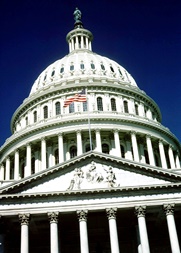
Hoosier business leaders can discuss public policy with their congressional members during the Indiana Chamber of Commerce’s annual D.C. Fly-in event on September 27-28.
The Washington gathering offers the opportunity for business leaders to meet with members of Indiana’s congressional delegation and let the lawmakers know how policies and bills being debated on the national stage will impact the state’s economy back home.
A highlight of the agenda: Sens. Joe Donnelly and Todd Young will lead a policy discussion following a dinner on the event’s opening night.
Day two includes a breakfast program that will feature Marc Lotter, special assistant to the President and press secretary to Vice President Mike Pence. Lotter is a native Hoosier with decades of experience in Indiana politics and was also Pence’s press secretary through the 2016 campaign and transition.
Group visits to congressional offices will take place after the morning program.
Zimmer Biomet is the dinner sponsor. Allegion is the cocktail reception sponsor. Build Indiana Council is the Legislative Briefing Sponsor.
“Zimmer Biomet is proud to be a long-time sponsor of the Indiana Chamber’s D.C. Fly-in. This is a unique opportunity to interact with members and staff of the Indiana Congressional delegation. There is no better way to discuss a wide range of policy issues affecting the Hoosier business community and to see firsthand what is happening on Capitol Hill,” says Chris Cerone, vice president of global government affairs for Zimmer Biomet of Warsaw.
Register for the D.C. Fly-in online or by calling customer service at (800) 824-6885. Cost is $199 per person, with group discounts available. Each attendee is responsible for securing travel arrangements. Discounted hotel rooms are available for Indiana Chamber Fly-in guests at the Hyatt Regency Washington on Capitol Hill.
Event sponsors are AT&T, The Boeing Company, Duke Energy, The Kroger Co., Old National Bank and Wabash Valley Power.

 Progress on health care reform by Senate Republicans came to a halt very early this morning as the so-called “skinny repeal” of the Affordable Care Act (ACA) narrowly failed 49-51. All Democrats were joined in their opposition by Republican senators Susan Collins (Maine), John McCain (Arizona) and Lisa Murkowski (Alaska).
Progress on health care reform by Senate Republicans came to a halt very early this morning as the so-called “skinny repeal” of the Affordable Care Act (ACA) narrowly failed 49-51. All Democrats were joined in their opposition by Republican senators Susan Collins (Maine), John McCain (Arizona) and Lisa Murkowski (Alaska). Senators Joe Donnelly (D-IN) and Cory Gardner (R-CO) have re-introduced the bipartisan FDA Regulatory Efficiency Act, which would allow the Food and Drug Administration (FDA) to bring innovative medical devices to market more quickly.
Senators Joe Donnelly (D-IN) and Cory Gardner (R-CO) have re-introduced the bipartisan FDA Regulatory Efficiency Act, which would allow the Food and Drug Administration (FDA) to bring innovative medical devices to market more quickly.
 As part of the Indiana Chamber’s robust federal advocacy program, Caryl Auslander will be working with the Indiana delegation (both in Washington, D.C. and here in Indiana) throughout the year. Look for additional stories and coverage of our federal efforts on your behalf in these reports and through other communications.
As part of the Indiana Chamber’s robust federal advocacy program, Caryl Auslander will be working with the Indiana delegation (both in Washington, D.C. and here in Indiana) throughout the year. Look for additional stories and coverage of our federal efforts on your behalf in these reports and through other communications. At a series of press conferences Aug. 29, the Indiana Chamber reaffirmed its endorsement of Congressman Todd Young (R-IN, 9th District) for the U.S. Senate. The announcement was first made at the Associated Builders and Contractors training facility on the east side of Indianapolis, followed by stops in South Bend and Fort Wayne.
At a series of press conferences Aug. 29, the Indiana Chamber reaffirmed its endorsement of Congressman Todd Young (R-IN, 9th District) for the U.S. Senate. The announcement was first made at the Associated Builders and Contractors training facility on the east side of Indianapolis, followed by stops in South Bend and Fort Wayne. To describe the 2016 primary elections in Indiana as anything less than dramatic and jarring seems an understatement. Two years ago, record low turnout tipped the balance to ideological sub-groups of motivated voters. This year, unprecedented turnout in both parties was the environment.
To describe the 2016 primary elections in Indiana as anything less than dramatic and jarring seems an understatement. Two years ago, record low turnout tipped the balance to ideological sub-groups of motivated voters. This year, unprecedented turnout in both parties was the environment.